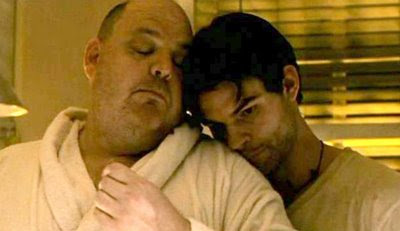"Mr. Darcy, Vampyre" Lacks Bite
 As Victorian scholar and a connoisseur of vampire literature I was excited when I came across Mr. Darcy, Vampyre, a modern continuation of Jane Austen’s Pride and Prejudice. I imagined the proud and obstinate Darcy as a man who struggles to tell his bride Elizabeth that he is a creature of the night. I hoped that the book would use the tropes of vampire literature in a way that commented on Austen’s original, or at the very least provide some steamy passages between Elizabeth and Darcy.
As Victorian scholar and a connoisseur of vampire literature I was excited when I came across Mr. Darcy, Vampyre, a modern continuation of Jane Austen’s Pride and Prejudice. I imagined the proud and obstinate Darcy as a man who struggles to tell his bride Elizabeth that he is a creature of the night. I hoped that the book would use the tropes of vampire literature in a way that commented on Austen’s original, or at the very least provide some steamy passages between Elizabeth and Darcy.I was sorely disappointed on both points. Grange’s work is an unappetizing mix of cheap melodrama and tired vampire lore. The former is not surprising when you consider the source. Pride and Prejudice is filled with frivolous women like Mrs. Bennett, whose only goal in life is to see her daughters well married and constantly swoons from shocks to her delicate nerves. But as to the second part of Grange’s novel, there can be no excuse for the mishandling of the prevalent themes of vampire prose.
Mr. Darcy, Vampyre reads like a best hits of the tropes of vampire literature. Darcy has all the stock characteristics of a vampire. He turns into a bat, can fly, has superhuman strength and unnatural sexual allure. Though these are the defining characteristics of the undead, they are not used to any significant effect in the story.
Darcy can also be out during the day, but this is an appropriate plot detail considering that a vampire’s aversion to sunlight was tacked on to the legend only after Stoker published Dracula. As compensation for this break in the myth, Grange makes Darcy vulnerable at sunset and sunrise. In a move reminiscent of the sparkly vampires of Twilight, he becomes transparent and will disappear entirely after repeated exposure.
 The narrative recycles the decrepit old castle from scores of other vampire stories. When Darcy and Elizabeth embark on their wedding tour they visit Darcy’s uncle who lives in an ancient castle in the Alps. Their visitation of Darcy’s uncle is a near carbon copy of Harker’s trip to Dracula’s castle, as Elizabeth sees the same colored flames dancing on the ground as she enters the fortress. The name of Darcy’s uncle is also Count Polidori in a trite reference to the author of the first piece of vampire prose, John Polidori.
The narrative recycles the decrepit old castle from scores of other vampire stories. When Darcy and Elizabeth embark on their wedding tour they visit Darcy’s uncle who lives in an ancient castle in the Alps. Their visitation of Darcy’s uncle is a near carbon copy of Harker’s trip to Dracula’s castle, as Elizabeth sees the same colored flames dancing on the ground as she enters the fortress. The name of Darcy’s uncle is also Count Polidori in a trite reference to the author of the first piece of vampire prose, John Polidori.The novel uses vampirism as a metaphor for sexual desire, but doesn’t bring anything new or significant to this theme. Elizabeth is sexually frustrated when Darcy avoids her bed and doesn’t consummate their relationship. Likewise, Darcy is torn by his desire for Elizabeth and his need to keep her safe from his ardor. The combination of two such passionate natures should make for fireworks on the page, but the novel falls flat here. Elizabeth and Darcy have just one moment of passion when Elizabeth offers to become a vampire herself, but it only lasts for a few lines.
The ultimate shortcoming of Grange’s novel is how it ends. Elizabeth has decided to become one of the undead, but just as she and Darcy are about to consummate their eternal love, a cure to vampirism is revealed by the head-man of a local village. How convenient. They descend into an underground cavern where a tablet of ancient writing holds the key to Darcy’s salvation. In an Indiana Jones moment, the chamber is blocked by falling debris and begins to flood with water.
The tablet instructs Darcy to "hold on to what is true" and the head-man urges Darcy to hold fast to the tablet. In the story’s most melodramatic moment, Darcy realizes that Elizabeth, not the tablet is true and the two clutch each other as the water rises. But as the two exchange passionate kisses the water recedes, washing away the fang marks on Darcy’s neck left by his maker Lady Catherine. Darcy’s ridiculous transformation is staged by the author to show the power of true love can overcome any obstacle, even vampirism.



'Is there a story Jane Austen was afraid to tell?' No, the woman had the good sense not to write drivel! What is with these 'reinventions of classics? Also what is with book trailers?
ReplyDeletewww.musingcontinuum.com